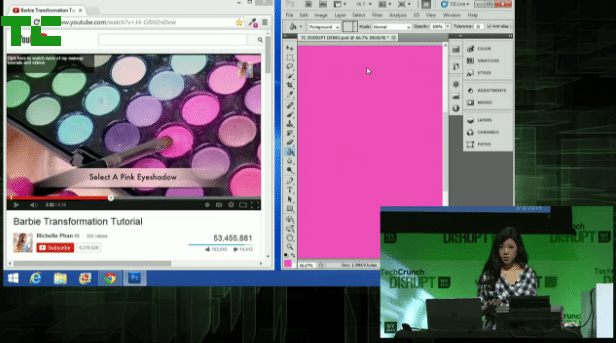 Last week, a 3D printer that prints makeup was launched at TechCrunch’s Disrupt NY Stage, where founder Grace Choi called the bluff on premium make up brands that sold make-up in exclusive colors with a high-price markup. Choi has invented a desktop printer, Mink, that can print popular makeup in a color of your choice at a price of mass-scale product.
Last week, a 3D printer that prints makeup was launched at TechCrunch’s Disrupt NY Stage, where founder Grace Choi called the bluff on premium make up brands that sold make-up in exclusive colors with a high-price markup. Choi has invented a desktop printer, Mink, that can print popular makeup in a color of your choice at a price of mass-scale product.
Take a look here to listen to Grace Choi’s presentation and demonstration where she “prints” a square blob of pink eyeshadow.

Through Mink, Choi wants girls and young women to follow their mind on their makeup choice and not have corporations dictate what they can afford or have access to. “The definition of beauty is something that they should be able to control and not our corporations”, says Grace Choi.
More power to the people. Sound familiar? The 3D printing movement has sprung up on us with the technology backing commercial use available now but also because the human-powered mindset. And as it is evident in this demo, it is set to disrupt conventional business models – on price, convenience, distribution, access and more.
How is 3D printing Changing Business Paradigms
Local, Local, Local
Like Grace Choi, who printed her own makeup, with 3D printing, products will be custom built locally and not shipped cross -country. While we are a long ways off from everyone having direct access to 3D printers, communities can be built around 3D printing users which will foster homegrown ideas and build local economies. There is no longer a need to be close to or accessible to a manufacturing hub, or from a different approach, manufacturing hubs can be located anywhere.
Free-Will Product Design and Development
3D printing is the mother of all open source design opportunities. Human-centric technology allows for experimentation and challenging the norm. 3D printing presents human ingenuity with a blank canvas. These are all the tools for a great big disruption that can put older business methodologies into obsolescence.
Boon to Resource Deficiency and Sustainability
Mass production costs resources and money. There are large environmental and economic costs to producing, storing, transporting and distributing goods. 3D printing can cut those costs and lower lifecycle impact of consumer goods. Businesses that realize savings through smart resource management will apply this shift to other systems, creating more disruption and better resource use.
Customization is the King
There are products that will and should continue to be mass produced. But with a people-powered movement, the demand for customization will spur new business verticals and avenues.
With all these new and emerging technologies that are being powered by social networks – how is your business going to adapt, evolve or change?
- If you are a cosmetic giant what was your reaction when you saw Grace Choi print her eyeshadow? What happens when a 3D printer turns any camera, phone or laptop into an endless beauty aisle
- Would your business change if you were a medium business distributer for mass-produced, generic goods?
- You are in the packaged food sector? Do you have reason to worry?
General Electric’s CEO Jeffrey Immelt underscored the importance of 3D printing when he said that it is ‘worth my time, attention, money, and effort’.
Is it worth yours?
CSW Summit Brussels, June 5 & 6 will focus on consumer led innovation and advances in the collaborative economy that are forcing corporations to listen and pay attention. Speaker Deepak Mehta from 3DEE will talk about ‘3DPrinting: The Impact of Personal Fabrication on Business Models. Deepak will preview the endless possibilities when the worlds of 3D Printing, Makers Movement, Manufacturing, Product Development –collide. Join us. View full agenda and registration information for CSW Summit Brussels.




0 Comments